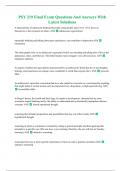PSY 219 Final Exam Questions And Answers With
Latest Solutions
A characteristic of adolescent thinking that leads young people (ages 10 to 13) to focus on
themselves to the exclusion of others. ANS adolescence egocentrism
repeatedly thinking and talking about past experiences; can contribute to depression ANS
rumination
The other people who, in an adolescent's egocentric belief, are watching and taking note of his or her
appearance, ideas, and behavior. This belief makes many teenagers very self-conscious. ANS
imaginary audience
An aspect of adolescent egocentrism characterized by an adolescent's belief that his or her thoughts,
feelings, and experiences are unique, more wonderful or awful than anyone else's. ANS personal
fable
An adolescent's egocentric conviction that he or she cannot be overcome or even harmed by anything
that might defeat a normal mortal, such as unprotected sex, drug abuse, or high-speed driving. ANS
invincibility fable
In Piaget's theory, the fourth and final stage of cognitive development, characterized by more
systematic logical thinking and by the ability to understand and systematically manipulate abstract
concepts. ANS formal operational thought
reasoning that includes propositions and possibilities that may not reflect reality ANS
hypothetical thought
reasoning in which a conclusion is reached by stating a general principle and then applying that
principle to a specific case (The sun rises every morning; therefore, the sun will rise on Tuesday
morning.) ANS deductive reasoning
reasoning from one or more specific experiences or facts to reach a general conclusion ANS
inductive reasoning
,the notion that two networks exist within the human brain, one for emotional processing of stimuli
and one for analytical reasoning ANS dual processing
Thought that arises from an emotion or a hunch, beyond rational explanation, and is influenced by
past experiences and cultural assumptions. ANS intuitive thought
Thought that results from analysis, such as a systematic ranking of pros and cons, risks and
consequences, possibilities and facts. Analytic thought depends on logic and rationality. ANS
analytic thought
the use of electronic communication to bully a person, typically by sending messages of an
intimidating or threatening nature. ANS cyberbullying
An approach to understanding intelligence that sees ability as innate, a fixed quantity present at birth;
those who hold this view do not believe that effort enhances achievement. ANS entity theory of
intelligence
An approach to understanding intelligence that holds that intelligence can be directly increased by
effort; those who subscribe to this view believe they can master whatever they seek to learn if they
pay attention, participate in class, study, complete their homework, and so on. ANS incremental
theory of intelligence
an evaluation that is critical in determining success or failure ANS high-stakes test
eriksons term for the fifth stage of development, in which the person tries to figure out "who am I"?
but is confused as to which of many possibles roles to adopt ANS indentity versus role confusion
Erikson's term for the attainment of identity, or the point at which a person understands who he or she
is as a unique individual, in accord with past experiences and future plans ANS indentity
achievement
, a situation in which an adolescent does not seem to know or care what his or her identity is ANS
role confusion
Erikson's term for premature identity formation, which occurs when an adolescent adopts parents' or
society's roles and values wholesale, without questioning or analysis ANS foreclosure
An adolescent's choice of a socially acceptable way to postpone making identity-achievement
decisions. Going to college is a common example. ANS moratorium
a person's acceptance of the roles and behaviors that society associates with the biological categories
of male and female ANS gender identity
parents' ongoing awareness of what their children are doing, where, and with whom ANS
parental monitoring
The belief that family members should support one another, sacrificing individual freedom and
success, if necessary, in order to preserve family unity. ANS familism
Encouragement to conform to one's friends or contemporaries in behavior, dress, and attitude; usually
considered a negative force, as when adolescent peers encourage one another to defy adult authority.
ANS peer pressure
destructive peer support in which one person shows another how to rebel against authority or social
norms ANS deviancy training
A term that refers to whether a person is sexually and romantically attracted to others of the same
sex, the opposite sex, or both sexes. ANS sexual orientation
feelings of hopelessness, lethargy, and worthlessness that last two weeks or more ANS major
depression




